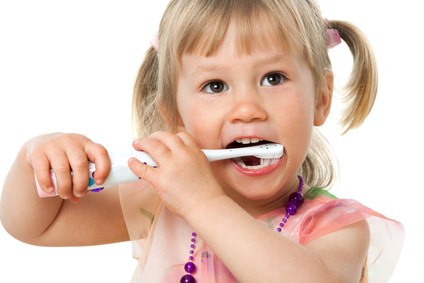
Introducing your child to best dental practices at an early age promotes healthy dental habits for life.
It’s never too early to get a healthy start at life. Introducing your child to a friendly dental atmosphere at a young age does more than just help keep their teeth stay healthy with regularly scheduled cleanings and checkups, it also helps set the stage for healthy dental habits that will continue with your child throughout their lifetime. This article is going to review the best practices and child dental care tips for our youngest patients, to those up to three years of age.
-
Begin Regular Dental Checkups at a Young Age
At Padden Dental, we encourage all our patients to get their children in for regular dental cleanings and checkups at an early age. In fact, as recommended by the American Academy of Pediatric Dentistry, a child should be seen by a dentist within six months of their first tooth erupting or by 12 months of age, whichever comes first.
-
Feed Your Child a Healthy Diet
Dietary choices for your young child will have a tremendous effect on their overall dental and oral health. Furthermore, the types of food your young child eats will shape their eating habits that will remain with them throughout life. Be sure that your child is drinking plenty of water, and limit their juice intake to only four to six ounces per day. Your child’s diet should consist primarily of fruits, vegetables, grain, and dairy products and avoid foods that are high in sugar.
-
Healthy Bottle Habits
Proper use of bottles and sippy cups is important to prevent early tooth decay. Caregivers should always be holding the infant while giving them a bottle. Bottles and sippy cups should never be given to an infant while they are in a crib, and never place bottles into the infant’s mouth and “prop” them into place. Infants should be taught how to sip from a cup as soon as they are sitting upright without support, usually between six to nine months of age. Around 12 months of age is ideal to start weaning from the bottle, and the American Academy of Pediatrics recommends the bottle habit should be taken away completely by 18 months.
-
Preventing Infant Tooth Decay
Special measures need to be taken with young children in order to prevent tooth decay. Infants should only be given bottles at mealtimes, and never at bedtime when the sugars from milk or juice can sit on their teeth throughout the night. Infants’ teeth need to be brushed regularly as soon as the first tooth erupts.
-
Brushing Habits
Children should have their teeth brushed with an American Dental Association (ADA) – approved toothpaste, following every meal starting in the first year of life after the first tooth has come in. Infants and toddlers need the assistance of a caregiver to ensure that all surface areas of the teeth have been cleaned thoroughly. In instances that brushing is not possible, children should have their teeth rinsed with water.
-
Safety Concerns
Children should have their own toothbrush that is the appropriate size for their age. Caregivers need to store the toothbrush in a sanitary place that avoids cross contamination, and they should be replaced every three months.
Remember that dental emergencies can occur at any time and at any age. It’s important that all parents or caregivers have the number to a dentist office that provides emergency dental care in case of:
- Toothaches
- Broken tooth
- Broken jaw
- Cut or bitten tongue, cheek, or lip
- Persistent bleeding after a tooth falls out
At Padden Dental, we are ready to become your child’s friendly dental home. Consistency is important so that your child feels comfortable in their family dental office. We are also ready to handle emergency dental cases, so go ahead and give us a call at (360) 213-1999 to schedule an appointment for yourself or your child today.
